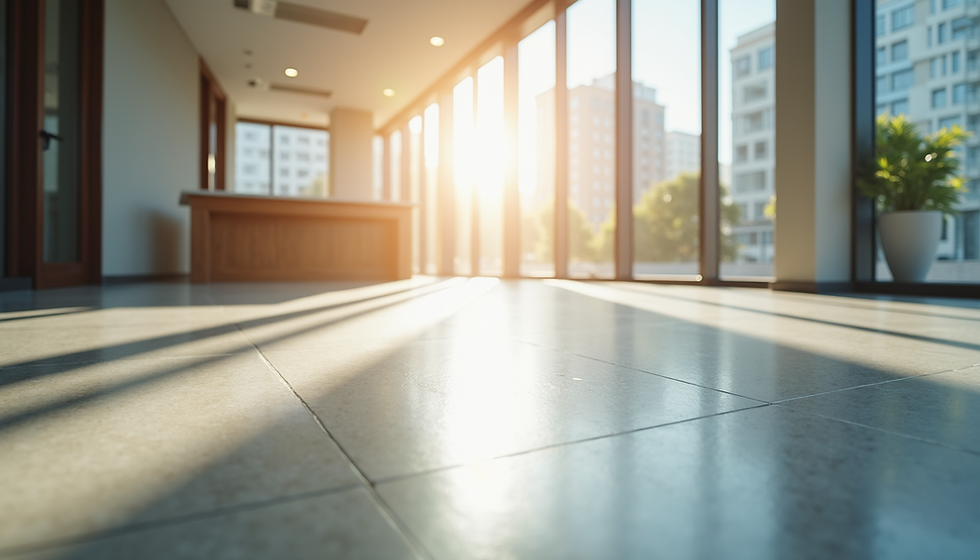Choosing the Right Commercial Flooring: A Complete Guide for Businesses
- Carter Banks
- Mar 14, 2025
- 4 min read

Your commercial flooring is more than just a surface—it’s a reflection of your brand, a foundation for productivity, and a crucial factor in creating a welcoming environment for employees and clients alike. The right flooring enhances aesthetics, ensures durability, and contributes to a safe and comfortable workspace.
With so many options available, choosing the ideal commercial flooring can feel overwhelming. Whether you're designing a new office, renovating a retail space, or upgrading a high-traffic area, this guide will walk you through the essential factors to consider to ensure a smart, long-term investment.
1. Assess Your Business Needs and Space
Before selecting a flooring type, it’s essential to evaluate your business’s unique requirements. Consider the following factors:
Traffic Flow
High-traffic areas (e.g., lobbies, hallways, and retail stores) need durable, wear-resistant flooring.
Low-traffic areas (e.g., private offices or meeting rooms) can accommodate softer or more decorative materials.
Functionality & Performance
Sound absorption: Carpet tiles help reduce noise in busy office settings.
Water resistance: Kitchens, restrooms, and medical facilities require waterproof flooring like tile or LVT (Luxury Vinyl Tile).
Slip resistance: Safety is key in workplaces, especially in areas exposed to spills or moisture.
Aesthetic Appeal
Your flooring should align with your brand identity.
Modern corporate offices: Sleek LVT or engineered hardwood.
Retail spaces: High-end tiles, polished concrete, or luxury vinyl.
Healthcare & hospitality: Easy-to-clean and hygienic flooring like vinyl or tile.
Maintenance & Longevity
Consider daily upkeep requirements. Some floors demand more frequent cleaning than others.
Choose materials with long-lasting durability to reduce replacement costs over time.
2. Explore the Best Commercial Flooring Options
There are various flooring choices, each with its own set of advantages and considerations. Here’s a breakdown of the most popular options:
Carpet Tiles – Best for Offices & Co-Working Spaces

Pros: Sound absorption, comfortable underfoot, design flexibility, and easy replacement.
Cons: Susceptible to stains, requires regular vacuuming and deep cleaning.
Luxury Vinyl Tile (LVT) – Best for Versatility & Durability

Pros: Water-resistant, cost-effective, easy maintenance, available in wood and stone looks.
Cons: Can be prone to scratches from heavy furniture or sharp objects.
Engineered Hardwood – Best for Elegance & High-End Appeal

Pros: Classic natural beauty, adds value to a space, durable with proper care. Cons: Can be damaged by moisture, requires careful maintenance.
Tile (Porcelain or Ceramic) – Best for High-Traffic & Wet Areas

Pros: Extremely durable, water-resistant, easy to clean, available in numerous styles.
Cons: Hard and cold underfoot, grout lines require maintenance.
Concrete Flooring – Best for Industrial & Contemporary Spaces
Pros: Highly durable, low maintenance, customizable with stains and finishes. Cons: Can feel cold and hard, may require sealing to prevent stains.
3. Factor in Budget & Long-Term Costs
While upfront costs are important, considering long-term expenses can help make a cost-effective choice.
Initial Cost: Factor in both material and installation costs.
Maintenance Costs: Some floors require periodic sealing, polishing, or refinishing.
Durability & Replacement: Investing in high-quality flooring reduces the need for frequent replacements.
Pro Tip: Although cheaper flooring may seem like a bargain, investing in a durable, high-quality option often saves money in the long run.
4. The Importance of Professional Installation
Even the best flooring won’t perform well if installed incorrectly. Here’s why professional installation matters:
Expertise: Professionals ensure precise installation for maximum durability and appearance.
Efficiency: Quick, hassle-free installation minimizes downtime for your business.
Warranty & Support: Many flooring providers offer warranties on both materials and labor.
5. Sustainability & Eco-Friendly Flooring Choices
Many businesses prioritize sustainability when selecting flooring. Here’s what to consider:
Eco-Friendly Materials:
Bamboo flooring (rapidly renewable resource)
Recycled carpet tiles (made from post-consumer materials)
Cork flooring (sustainable and naturally antimicrobial)
Low VOC Emissions:
Choose flooring with low volatile organic compound (VOC) emissions to improve indoor air quality and maintain a healthier workspace.
Choosing the right commercial flooring is a major decision that impacts your business's aesthetics, functionality, and long-term costs. By assessing your specific needs, exploring flooring options, and working with experienced professionals, you can create a workspace that is not only visually appealing but also practical and durable.
Looking for expert flooring solutions? Contact Mago Flooring today for a free consultation and let our team help you select the best commercial flooring for your business!
Frequently Asked Questions (FAQs)
1. What is the best commercial flooring for high-traffic areas?
Luxury Vinyl Tile (LVT), porcelain tile, and polished concrete are excellent choices for durability and easy maintenance in high-traffic spaces.
2. How do I choose flooring that matches my brand identity?
Consider your industry and overall design theme. For a modern, sleek look, opt for engineered hardwood or LVT. For a cozy and inviting feel, carpet tiles work well.
3. What flooring options are easiest to maintain?
Luxury vinyl tile (LVT), tile, and concrete require minimal upkeep, making them ideal for businesses looking for low-maintenance flooring.
4. Is carpet a good choice for commercial spaces?
Yes, especially for office environments where sound absorption is essential. However, it requires regular cleaning to maintain its appearance.
5. What is the most cost-effective commercial flooring option?
LVT offers the best balance between affordability, durability, and design flexibility. It mimics high-end materials like hardwood or stone without the hefty price tag.
6. How can I ensure my flooring lasts longer?
Regular maintenance, proper cleaning techniques, and using protective pads under heavy furniture can help extend the life of your flooring.
Ready to Upgrade Your Commercial Flooring?
Call Mago Flooring today for a free consultation and expert guidance!



Comments